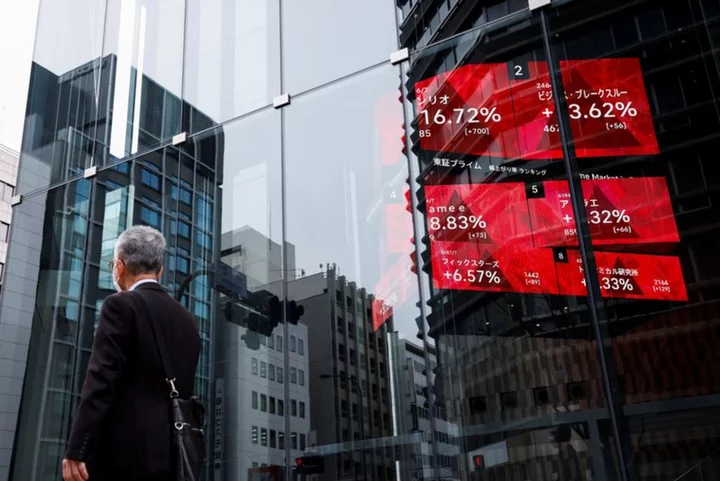By Jamie McGeever
A look at the day ahead in Asian markets from Jamie McGeever, financial markets columnist.
A double dose of the U.S. Treasuries and dollar 'pain trade' looks set to put Asian markets on the defensive on Wednesday, with investors also bracing for South Korean inflation figures and an expected interest rate hike from the Bank of Thailand.
The slump in U.S. bonds on Tuesday pushed the 10-year yield above 4.0%, and the 30-year yield above 4.10% for the first time since November, lifting the dollar and sapping any risk appetite investors might have had on the first day of the new month.
Several indicators, from big Wall Street banks' client surveys to futures market positioning data, show investors are not positioned for that. They are heavily 'long' Treasuries and 'short' dollars - moves like Tuesday's will hurt.
They will also add to the volatility and uncertainty evident in some key Asia and Pacific markets, notably Japanese assets following the Bank of Japan's policy tweak, and the Australian dollar after the country's central bank kept rates on hold at 4.10%.
The Aussie dollar's 1.6% slide against the greenback on Tuesday was its biggest fall since the U.S. regional banking shock in early March. The yen has fallen nearly 4% since the BOJ tweaked its seven-year 'yield curve control' policy on Friday.
U.S. investors bringing money back home? If so, Asian and emerging markets will likely come under more selling pressure.
The U.S. earnings season reaches a peak this week with more than 100 companies reporting, including mega tech firms Apple and Amazon on Thursday. Tuesday's results were a mixed bag, allowing direction to be led by macro factors.
The Asian economic and policy calendar on Wednesday will be dominated by the Bank of Thailand's expected 25-basis-point interest rate increase to 2.25%, which is likely to mark the end of the tightening cycle.
But analysts don't expect the first rate cut until 2025 - although inflation has eased to 0.23%, below the central bank's target range of 1%-3%, policymakers anticipate a pick up in prices again later this year.
Annual inflation in South Korea, meanwhile, is expected to have slowed to 2.40% in July from 2.70% the month before. If so, that would mark the slowest pace since June 2021 and a significant deceleration from the 6.30% peak a year ago.
Here are key developments that could provide more direction to markets on Wednesday:
- Thailand interest rate decision
- South Korea CPI inflation (July)
- Singapore manufacturing PMI (July)
(By Jamie McGeever; Editing by Deepa Babington)

